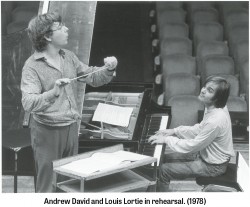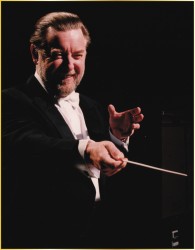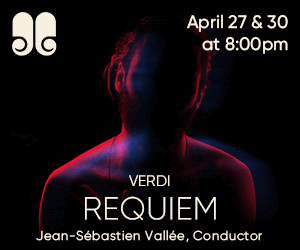 "I rather suspect you are going to be running into a bit of a ‘Sir Andrew Davis, this is your life’ ambush when you hit town this time” I say into the phone. The response is an amiable guffaw. It’s 8:05am Sunday morning, Melbourne time, for him; just after 6pm Saturday night here in Toronto for me. Davis is “waking up slowly” he says, after a performance with the Melbourne Symphony Orchestra, the third of three towering programs over a four-week period.
"I rather suspect you are going to be running into a bit of a ‘Sir Andrew Davis, this is your life’ ambush when you hit town this time” I say into the phone. The response is an amiable guffaw. It’s 8:05am Sunday morning, Melbourne time, for him; just after 6pm Saturday night here in Toronto for me. Davis is “waking up slowly” he says, after a performance with the Melbourne Symphony Orchestra, the third of three towering programs over a four-week period.
Davis is Chief Conductor at Melbourne, Conductor Laureate of the BBC Orchestra, and, for the past 15 years Music Director and Chief Conductor of Lyric Opera of Chicago (an appointment recently extended through the 2020/21 season).
He is, of course, also Conductor Laureate of the Toronto Symphony Orchestra, a position he assumed after being the TSO’s Music Director from 1975 till 1988. So, add the 27 years he’s been returning every year as Conductor Laureate to the 13 he spent as Music Director, and the stage is set for the “Forty Years on the TSO Podium” possible ambush I alluded to when he returns to town mid-May for a two-week, three-program stint commencing with the Verdi Requiem May 21, 22 and 23.
“It’s something I am tremendously proud of,” he says, before pointing out that in terms of consecutive years it’s actually 42 not 40;” Karel Ančerl had died in the summer of 1973” he explains, “so 1973/74 was one of those audition years. They were trying to keep as much of Ančerl ’s programming as possible intact, and so they needed someone for [Janáček’s] Glagolitic Mass ... not a pushover. But they knew I knew it; I’d had to learn it in four or five days in London in 1970 after being called in ‘due to the indisposition of a colleague,’ as they say. ... Anyway that was my very first TSO concert in May of 1974, Don Quixote in the first half and the Glagolitic in the second and it went well; in June Walter Homberger came over to England and offered me the job. But I was back again once more in the spring of 1975 before assuming the post in October. I remember that spring concert ... We did Elgar Two and afterwards Walter [Homberger] came rushing backstage – he had been sitting with an important board member – and Walter said ‘he (the board member) says tell him NO MORE ELGAR!’” Another great guffaw.
(That October, by the way, the start of Davis’ first season as TSO Music Director was also the last season that the TSO provided the orchestra for the opera, he tells me in passing. But that it seems is a story for another day.)
A sense of opera, though, is very much part of the Davis conducting skill set, at a visceral and far-reaching level. First of the three programs he has just finished conducting in Melbourne, to rave reviews, is Berlioz’s Damnation of Faust. And the first of his three upcoming Toronto programs is the Verdi Requiem. I’ve seen him quoted as calling the Requiem “Verdi’s greatest opera” I say. “Yes, well I suppose that’s one of those things that get said,” he replies.
There seem to be parallels, I suggest – Damnation which is pretty near unstageable, and the Verdi which is in some profound way operatic. “I suppose that’s true. I like doing those big [single work] things which are always kind of tough but they are fun to do.” Both, he says, fall into a category that he likes to call “theatre of the mind” although, he points out, at Lyric Opera of Chicago they did successfully stage the Berlioz a few years back.
As for the Verdi Requiem, his operatic take on the work is further revealed when he describes the soloists he has assembled for the performance here. All of them (Amber Wagner, soprano, Jamie Barton, mezzo-soprano, Frank Lopardo, tenor, and Eric Owens, bass) are regulars at Lyric Opera. Owens for example, recently did Porgy for him at Lyric, and will return as Wotan in the new Ring Cycle Lyric will mount in 2020/21 – no doubt part of the reason for the six-year contract extension mentioned at the outset of this piece.
By the standards of the Melbourne engagement Davis is just coming off, the Toronto concerts this time round (the Verdi aside) perhaps offer slightly lighter fare (Mahler Three vs Holst’s The Planets for example.) But what they may lack in toughness they will certainly compensate for in other ways. Who can look at the photograph of the 18-year old Louis Lortie and the 34-year old Davis, preparing the Liszt: Piano Concerto No. 1 for the TSO’s historic 1978 voyage to visit to China and not want to find out what changes in artistry the years have brought to both men?
For each of the other pieces chosen for the three concerts there is some lovingly chosen historical referent. For example, the Toronto Children’s Chorus will join the TSO in the third of the concerts. The TSO was the first, Davis explains, to use a children’s chorus for the Holst and they will also perform the world premiere of a work by Ed Frazier Davis titled The Stolen Child for children’s chorus and orchestra a work, specially commissioned by the TSO for the occasion.
Frazier Davis is his son, Andrew Davis explains. And there’s a story too about Davis’ role in the formation of the Toronto Children’s Chorus. (As he explains it, they were recording The Nutcracker and needed a children’s chorus; he knew Jean Ashworth Bartle, and “that was that.”)
Forty years later, or forty two, Davis’ commitment to Toronto (and Toronto’s commitment to him) remain.
“I am very proud of my record here” he says. “There’s not one that I have missed. There was one that I was afraid I was going to miss because I was due I was going to miss, I can’t remember what year it was. I was due to do two weeks in the fall and that was when they went on strike. But as it happened I was also scheduled to come to conduct Messiah at Christmas and they had settled by then so I was delighted that my record remained unbroken.
Andrew Davis and the COC
 Andrew Davis’ first season as music director of the Toronto Symphony Orchestra was also the last season in which the TSO served as the orchestra for the Canadian Opera Company. It was an interesting time as players had to decide where their loyalties lay. “There were conflicts of time,” Davis says, “so basically from the word go the opera orchestra was a self-contained and separate entity.”
Andrew Davis’ first season as music director of the Toronto Symphony Orchestra was also the last season in which the TSO served as the orchestra for the Canadian Opera Company. It was an interesting time as players had to decide where their loyalties lay. “There were conflicts of time,” Davis says, “so basically from the word go the opera orchestra was a self-contained and separate entity.”
It’s hard to guage from chatting with Davis what the reasons were, but the fact remains that he was not invited to conduct at the COC until Ariadne in 2011, followed by a return visit the next year for what he describes as a “wonderful kinky double bill of A Florentine Tragedy and Gianni Schicchi.”
“And you know, at the time they said, you know, gosh here you are finally making your debut with the COC and I had to say, well you know, it’s not in fact my debut with the COC, it’s my debut as a conductor. Because there was one time back in the day when Lotfi [Mansouri] was in charge, they did a production of Fledermaus and they did this thing in Act Two of having guests come in an perform some extra song - I think Maureen [Forrester] came in and sang some sort of cabaret song. ... Well, I sang ‘I Am the Very Model of a Modern Major General’ ... in Fledermaus.”



